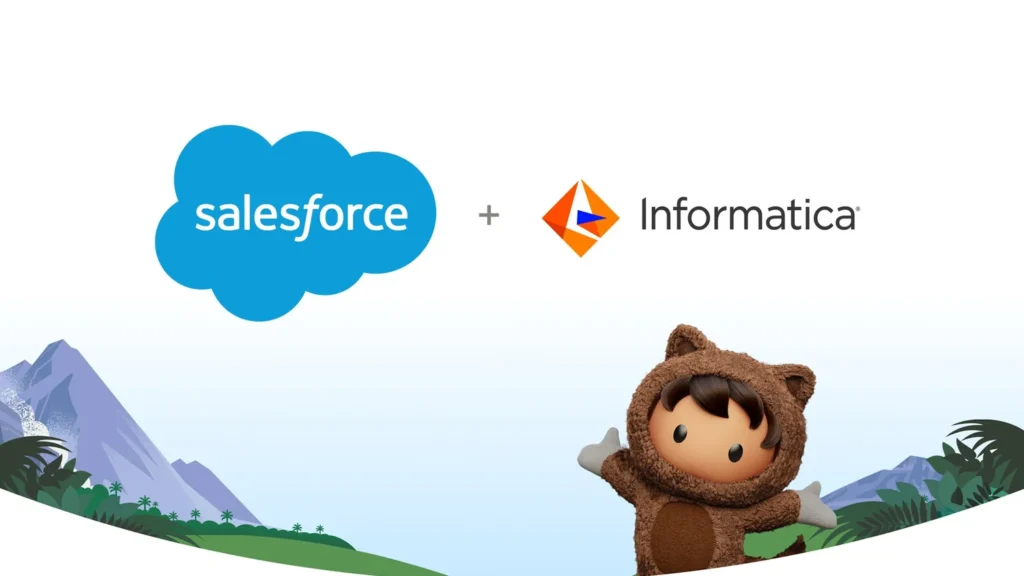This article was written by Tony Aromolaran, Salesforce Consultant.

Introduction: The Intersection of AI and Data
Salesforce announced a definitive agreement to acquire Informatica for about $8 billion in cash. The deal brings together Salesforce’s AI stack with Informatica’s market-leading data integration, quality, and governance tools—laying a stronger foundation for real time analytics, automation, and trustworthy AI across industries and the nonprofit sector.

Why clean data makes or breaks AI
AI promises smarter predictions, faster decisions, and better customer experiences. But models are only as good as the data you feed them. Messy, incomplete, or non-compliant data leads to poor recommendations, higher costs, and risk exposure. Informatica closes that gap with data quality, master data management (MDM), metadata and lineage, ETL/ELT, and governance—so the data that powers AI is complete, standardised, and policy-aware before it hits any model.
How Informatica elevates Salesforce Data Cloud and Agentforce
Salesforce already unifies, activates, and secures customer and operational data. Adding Informatica strengthens four pillars:
- Data integration at scale – Unified pipelines across cloud and on-prem systems, batch and streaming, for faster time to value.
- Data quality and standardisation – Profiling, deduplication, and validation to reduce model drift and improve signal-to-noise.
- Governance and compliance – Catalogues, lineage, stewardship, and policies aligned to frameworks like GDPR and HIPAA.
- Master data management – Single, trusted views of customers, products, suppliers, donors, and patients for accurate personalisation and reporting.
Salesforce’s own announcement highlights the combination of Einstein and CLAIRE to deliver a trustworthy, scalable AI-data platform—precisely where enterprises have struggled to stitch tools together.
Data Cloud: Better real time unification and activation
Data Cloud consolidates signals from commerce, service, marketing, sales, apps, and devices to build a living profile for each customer.
What improves with Informatica:
- Pre-ingest cleanup and standardisation stop inconsistent fields, duplicate records, and format mismatches from polluting profiles.
- Automated data integration connects cloud warehouses, lakes, and legacy systems without brittle glue code.
- Policy-first data handling enforces consent, retention, residency, and minimisation by design.
Use case (Retail): A global retailer personalises offers in real time. Informatica cleans purchase histories and loyalty data as it lands, so models find the true patterns and stop chasing noise.
Use case (Telecommunications): A telco feeds network events and billing records into Data Cloud. With automated standardisation, recommendations are grounded in accurate usage, not mismatched IDs.
Agentforce: Smarter automation with trustworthy inputs
Agentforce uses AI to predict intent, route work, and resolve tasks. Its results improve dramatically when the underlying data is accurate and current.
What improves with Informatica:
- High-quality inputs give agents reliable context, reducing false positives and repetitive escalations.
- Secure, consistent data flows keep automations in sync across systems of record.
- Operational efficiency rises as agents spend less time correcting bad data and more time resolving customer needs.
Use case (Financial Services): Automating fraud checks on transactions works only if the data is verified and consistent. Informatica’s validation reduces false alerts and improves actual catch rates.
Use case (Healthcare): Predictive care insights depend on governed patient data. Informatica strengthens privacy controls and lineage, supporting safer AI-assisted triage and outreach.
Nonprofits: Turning supporter data into real impact
Nonprofits run on trust and outcomes. With Salesforce, they already track donors, volunteers, grants, and programmes. Informatica helps them go further:
- Unified donor profiles by consolidating gifts from fundraising platforms, events, and social campaigns.
- Clean, current records that power better segmentation, pledge forecasting, and volunteer scheduling.
- Built-in compliance to protect sensitive supporter information while enabling targeted, respectful engagement.
Use case (Disaster Relief): Donations flow from payment processors, forms, and peer-to-peer campaigns. Informatica standardises and deduplicates records so Data Cloud can personalise thank-yous and appeals.
Use case (Education): Predictive models flag supporters most likely to give this quarter. With governed historical data, Einstein targets the right audience with the right message.
Practical steps to capture value fast
- Inventory critical data domains (customers, products, donors, patients). Map sources, owners, and quality issues.
- Prioritise Data Cloud ingestion for high-impact use cases (churn reduction, offer personalisation, grant reporting).
- Apply quality gates: profiling, dedupe rules, reference data, and validation before any AI training or activation.
- Stand up governance: a lightweight council, owners, and policies for consent, retention, lineage, and access.
- Pilot, then scale: prove a narrow use case, measure lift (conversion, AHT, NPS, fundraising ROI), and expand.
Competitive edge and market context
The Informatica deal follows Salesforce’s multi-year push to pair CRM data with deeper analytics and AI. After talks fell through in 2024, both companies returned to the table and agreed on $25 per share in 2025, underscoring how strategic high-quality data has become for enterprise AI. Closing is expected after standard approvals.
FAQs (quick hits)
Is the acquisition completed?
Salesforce and Informatica signed a definitive agreement; completion is expected after regulatory and customary approvals, with close around Q1 2026.
What changes for existing customers?
Deeper, out-of-the-box integrations across Data Cloud and Agentforce, stronger data quality and MDM, and clearer governance workflows.
How does this help AI accuracy?
Cleaner inputs and a governed data layer reduce hallucinations, improve feature quality, and raise precision/recall in predictions.
Conclusion: The future of AI-powered data management
Salesforce’s move to bring Informatica into its platform shows that great AI needs great data. With robust integration, quality, MDM, and governance woven directly into Data Cloud and Agentforce, organisations can scale predictive analytics, personalisation, and automation with confidence—while meeting privacy and compliance obligations. It’s a practical path to AI that is useful, measurable, and trusted. organizational missions.
